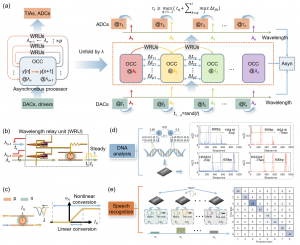Monolithically integrated asynchronous optical recurrent accelerator
GA, UNITED STATES, May 7, 2025 /EINPresswire.com/ -- Scientists from China have developed a breakthrough asynchronous optical computing accelerator based on wavelength encoding. This architecture overcomes synchronization challenges in conventional optical recurrent processors, significantly reducing both the energy consumption of electronic components and the complexity of optical layout design. The chip enables efficient computing for large-scale AI tasks, such as DNA analysis and speech recognition, while achieving high energy efficiency.
Modern artificial intelligence (AI) faces critical challenges in energy consumption and processing latency due to the inherent limitations of electronic processors. Optical computing has emerged as a promising alternative; however, state-of-the-art systems depend heavily on frequent optical-electrical conversions and precise synchronization. This issue is particularly pronounced in recurrent AI models, where even slight temporal misalignments can accumulate over iterations, leading to severe signal degradation. These constraints not only impede large-scale parallel processing but also significantly limit overall computational efficiency.
In a recent publication in eLight, several scientists from Huazhong University of Science and Technology, China developed a monolithically integrated asynchronous optical recurrent accelerator. This novel system maps time sequences to wavelength channels, utilizing on-chip wavelength relay units (WRU) to eliminate the requirement for strict synchronization, thereby significantly improving computational efficiency.
"Our design circumvents the conventional reliance on high-speed electronic components for synchronization," explains by these scientists. "By using wavelength relay units instead of traditional ADCs and DACs, we effectively reduce energy consumption while enabling efficient parallel signal processing."
The research team successfully implemented two pioneering optical computing models on-chip:
1. Optical Hidden Markov Model (OHMM) chip – Capable of analyzing DNA sequences with an impressive 99% accuracy, demonstrating potential for bioinformatics applications.
2. Optical Recurrent Neural Network (ORNN) chip – Achieved 87.7% accuracy in an 8-class speech recognition task, showcasing its feasibility in real-time AI-driven communication and language processing.
The monolithic integration of these models marks a breakthrough in optical computing, as both operate without the requirements of high-speed electrical synchronization, a long-standing challenge in photonic AI hardware.
The compact chip within 10 mm² footprint integrates hundreds of optical computing components, leveraging the inherent advantages of light-based processing. Unlike traditional electronic AI accelerators, which suffer from power-hungry transistors and heat dissipation issues, this optical accelerator functions with minimal energy overhead.
Furthermore, by utilizing wavelength multiplexing, the architecture efficiently handles high-dimensional parallel computations. This capability is crucial for future AI applications, where processing speed and power efficiency are paramount.
"This breakthrough paves the way for efficient AI computing in autonomous vehicles, smart robotics, and beyond,” note the scientists. “The ability to process massive data streams without electrical synchronization opens new avenues for real-time decision-making in AI systems."
Looking ahead, the team aims to scale the architecture for commercial AI hardware applications. The combination of high-speed and energy-efficient computation makes this optical accelerator a strong contender for next-generation AI hardware solutions.
With successive advancements in photonic integration and wavelength multiplexing, monolithic asynchronous optical accelerators may soon redefine the landscape of AI processing, bridging the gap between high-performance computing and sustainable energy consumption.
References
DOI
10.1186/s43593-025-00084-y
Original Source URL
https://doi.org/10.1186/s43593-025-00084-y
Funding information
This research received funding from the National Key Research and Development Project of China, National Natural Science Foundation of China, and Knowledge Innovation Program of Wuhan.
Lucy Wang
BioDesign Research
email us here
Legal Disclaimer:
EIN Presswire provides this news content "as is" without warranty of any kind. We do not accept any responsibility or liability for the accuracy, content, images, videos, licenses, completeness, legality, or reliability of the information contained in this article. If you have any complaints or copyright issues related to this article, kindly contact the author above.
Global Advanced Process Control (APC) Market Insight, Growth, Industry Trends | Reports and Data
Gas Engine Market to Grow at 3.8% CAGR, Reaching $6.0 Bn by 2031
New Music Alert Gospel Rock Artist Rikki Doolan Releases Anthemic Single You Got Somebody
Więcej ważnych informacji
 Jedynka Newserii
Jedynka Newserii

 Jedynka Newserii
Jedynka Newserii

Konsument

Polacy nie korzystają z hossy trwającej na warszawskiej giełdzie. Na wzrostach zarabiają głównie inwestorzy zagraniczni
Od października 2022 roku na rynkach akcji trwa hossa, nie omija ona także warszawskiej giełdy. Mimo to inwestorzy indywidualni odpowiadają zaledwie za kilkanaście procent inwestycji, a o wzrostach decyduje i na nich zarabia głównie kapitał z zagranicy. Widać to również po napływach i odpływach do i z funduszy inwestycyjnych. Zdaniem Tomasza Koraba, prezesa EQUES Investment TFI, do przekonania Polaków do inwestowania na rodzimej giełdzie potrzeba zysków z akcji, informacji o tych zyskach docierającej do konsumentów oraz czasu.
Polityka
Obowiązek zapełniania magazynów gazu w UE przed sezonem zimowym ma zapewnić bezpieczeństwo dostaw. Wpłynie też na stabilizację cen

Unia Europejska przedłuży przepisy z 2022 roku dotyczące magazynowania gazu. Będą one obowiązywać do końca 2027 roku. Zobowiązują one państwa członkowskie do osiągnięcia określonego poziomu zapełnienia magazynów gazu przed sezonem zimowym. Magazyny gazu pokrywają 30 proc. zapotrzebowania Unii Europejskiej na niego w miesiącach zimowych. Nowe unijne przepisy mają zapewnić stabilne i przystępne cenowo dostawy.
Infrastruktura
Gminy zwlekają z uchwaleniem planów ogólnych zagospodarowania przestrzennego. Może to spowodować przesunięcie terminu ich wejścia w życie

Reforma systemu planowania i zagospodarowania przestrzennego rozpoczęła się we wrześniu 2023 roku wraz z wejściem w życie większości przepisów nowelizacji ustawy z 27 marca 2003 roku. Uwzględniono w niej plany ogólne gminy (POG) – nowe dokumenty planistyczne, za których przygotowanie mają odpowiadać samorządy. Rada Ministrów w kwietniu br. uchwaliła jednak ustawę o zmianie ustawy z 7 lipca 2023 roku, a jej celem jest zmiana terminu obowiązywania studiów uwarunkowań i kierunków zagospodarowania przestrzennego gmin na 30 czerwca 2026 roku. Wskazana data może nie być ostateczna z uwagi na to, że żadna z gmin nie uchwaliła jeszcze POG.
Partner serwisu
Szkolenia

Akademia Newserii
Akademia Newserii to projekt, w ramach którego najlepsi polscy dziennikarze biznesowi, giełdowi oraz lifestylowi, a także szkoleniowcy z wieloletnim doświadczeniem dzielą się swoją wiedzą nt. pracy z mediami.









.gif)

 |
| |
| |
|